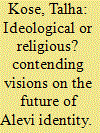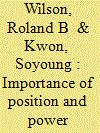| Srl | Item |
| 1 |
ID:
155026


|
|
|
|
|
| Summary/Abstract |
Following the lead of the post-positivist research agenda, Masih Ullah Khan studies the course of the European sovereign debt crisis using the discursive approach. In this regard, he first presents the positioning theory and then puts forth and explains landmark events during the crisis. He also details storylines created by different actors that directed and shaped the course of the crisis.
|
|
|
|
|
|
|
|
|
|
|
|
|
|
|
|
| 2 |
ID:
116590


|
|
|
|
|
| Publication |
2012.
|
| Summary/Abstract |
Establishing a coherent collective identity within the modern urban context among people who have different ideological, social and religious orientations, and social and economic backgrounds, is an ongoing struggle within the Alevi community in Turkey. This study tries to understand how alternative positions on Alevi identity dynamically construct the boundaries, moral contents and the new shape of Alevi identity in modern urban contexts through use of various discursive resources. At least two main contending 'positions' on Alevi identity try to institutionalise Alevi identity in modern urban contexts, which are 'Ideological Position' and 'Religious Position'. Those discourse positions constitute different visions about the past and the future of the Alevi community as well as the cultural and the political boundaries of Alevi identity. More importantly, those positions resonate in ordinary citizens' life stories as well as group narratives. This study utilises the analytical frame of 'positioning theory' to shed light on the complexities of identity negotiation.
|
|
|
|
|
|
|
|
|
|
|
|
|
|
|
|
| 3 |
ID:
160349


|
|
|
|
|
| Summary/Abstract |
This paper analyzes how U.S. foreign policy, based on symmetry or asymmetry,
drives international relations, and can lead to positive or negative state-to-state
relations. The paper uses the case of U.S. foreign policy towards North Korea to
discuss the importance of position and power when dealing with societies and
nations. The paper discloses that U.S. foreign policy approach towards North Korea
has not significantly evolved over the past 60 years regardless of administration
and that the current paradigm of dealing with complex state-to-state issues only
works to sustain negative relations. The paper further finds that the continued
negative relations and deep-rooted and protracted conflict between the United States
and North Korea is intimately connected to the way in which the United States
handles state-to-state relationships. On the basis of these observations, the paper
recommends alternative multi-dimensional foreign policy approaches based on
conflict analysis and resolution methods and tools needed to successfully transform
the relationship and build sustainable peace with North Korea and in the East Asia
Region.
|
|
|
|
|
|
|
|
|
|
|
|
|
|
|
|